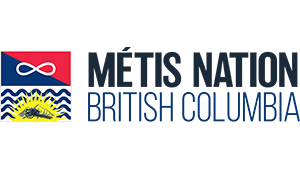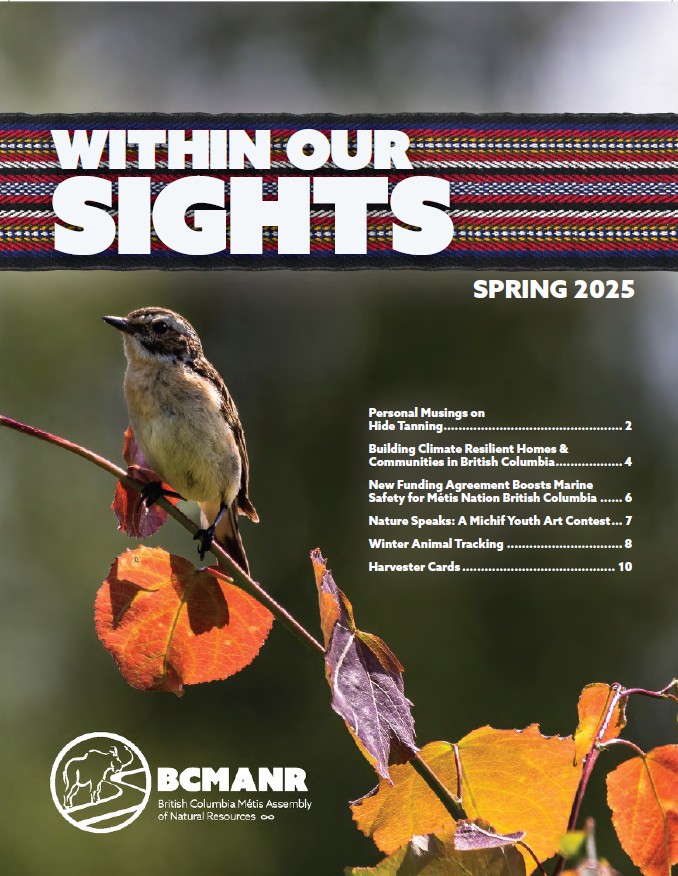
Consultation and Responsible Stewardship: Protecting Our Natural Resources and Connections
Environment, Climate Change & Food Security
Our Mandate
The Ministry advances research, advocacy, and programs to help connect Métis Citizens to the natural environment in British Columbia. This is done through centering and empowering Métis voices and values in matters related to climate change, conservation, and food security. These efforts honour the connections between Métis Citizens and all our relations so we may strive for a healthy and thriving planet for current and future generations.Our Responsibility
The Ministry is responsible for overseeing initiatives related to natural resources, land, and Métis traditional knowledge across all MNBC departments and Ministries.Our Priorities
Current priorities include, but are not limited to, climate change, emergency preparedness and response, consultation, harvesting and land use, migratory bird management and conservation, and species at risk.Our Partnership
This Ministry works closely with the British Columbia Métis Assembly of Natural Resources (BCMANR).Mailing Address
#380 – 13401 108 Ave
Surrey, B.C.
V3T 5T3Email
Phone
Toll-free: 1-800-940-1150
Phone: 604-557-5851Office Hours
Monday-Friday: 8:30am-4:30pm
Emergency Information
Access Emergency Information Here
***If you are injured or experiencing a life-threatening incident, you should immediately call 9-1-1 or your local emergency number***
Looking to enhance your skills in marine safety and emergency management? MNBC's Marine Safety Training program is pleased to offer funded opportunities for coastal community members to gain critical expertise in emergency preparedness and response.
The British Columbia Métis Assembly of Natural Resources (BCMANR)
Region 1 Captain – Curt Smecher
Region 2 Captain – Holly Tennant
Region 3 Captain – Marlene Beattie
Region 4 Captain, BCMANR Chair – Mark Carlson
Region 5 Captain – Gary Ducommun
Region 6 Captain – Rene Lucier
Region 7 A – Vic Lavallee
Region 7 B – Vacant
Additional Resources
Land Use research plays a significant role in giving Métis a strong voice when it comes to consultation processes and demonstrating that the land is important to us. This type of data can also assist in wildlife stewardship and conservation initiatives.
MNBC has worked with a world expert on this type of mapping research to develop a new methodology to gather this valuable data. The new methodology is similar to past mapping projects, but is more powerful and scientifically sound. It has been designed specifically for Métis land use in BC and has the power to be more effective if this information were ever to be used in court to protect Métis Land Use or fight for harvesting Rights.
This kind of knowledge and information gives Métis a stronger voice at negotiation and consultation tables. It is a powerful form of research and mapping and demonstrates the importance of land to Métis in BC. As we document what you have done on the land, (hunting, fishing, plant gathering, cultural use, etc.), the information we get is current, and cannot be ignored or tossed aside in negotiations or potential court cases. It is also important for promoting Métis culture and can demonstrate to others that Métis are out on the land using it.
The following Hodgepodge map is incomplete, as we have not interviewed all Métis harvesters in BC, but demonstrates strong Metis land use within the province.
Goose Moon 2023 Annual Progress Report
Metis Nation Climate Change Strategy
Métis Food (In)security and Food as Medicine
Climate Change & Food Access Survey Report
Métis Climate Resilience Gathering Summary
Emergency Management Questionnaire
Emergency Support Framework Phase 1: Research Recommendations
MNBC Climate Preparedness Workshop
The Duty to Consult and, where appropriate, accommodate, emerges from the recognition and affirmation of Aboriginal and treaty rights in Section 35(1) of the Constitution Act, 1982. These rights are coupled with the Supreme Court of Canada’s recognition of the obligation to protect the honour of the Crown. As Chief Justice Beverley McLachlin explained in the 2004 Haida decision, “[i]t is a corollary of Section 35 that the Crown act honourably in defining the rights it guarantees and in reconciling them with other rights and interests. This, in turn, implies a duty to consult and, if appropriate, accommodate.” Because this obligation applies only to those rights affirmed and recognized in Section 35 of the Constitution Act, 1982, the duty to consult in Canada is associated with rectifying the imbalance of power that historically has existed in the country between the government and Aboriginal peoples.
Thomas Isaac wrote in his 2016 report, A Matter of National and Constitutional Import: A Report of the Minister’s Special Representative on Reconciliation with Métis: Section 35 Métis Rights and the Manitoba Métis Decision, that “there is no doubt, at law, the Crown’s duty to consult Aboriginal peoples applies to Métis”. The Métis in British Columbia are Section 35 rights holders. These collective rights are represented by the Métis in British Columbia’s governing body, MNBC.
More than a decade ago, BCMANR and the MNBC Board approved the MNBC Consultation Guidebook, which included Consultation Guidelines and a Métis Traditional Knowledge Policy. During the 2017 Métis Nation Governing Assembly (MNGA), BCMANR made a commitment to return to the next MNGA with recommendations, and, at the 2018 MNGA, a further commitment was made to have a consultation table at our 40 Métis Rights and Reconciliation Community Engagement sessions in order to solicit feedback from our community leaders and citizens.
MNBC and BCMANR present the following updated draft Consultation Guidelines as a result of the above feedback coupled with following best practices in place from other Section 35 Rights Holders.
Note: The Métis Traditional Knowledge Policy has not been updated yet.
References:
Haida Nation v. British Columbia (Minister of Forests), [2004] 3 S.C.R. 511, 2004 SCC 73
Thomas Isaac, A Matter of National and Constitutional Import: A Report of the Minister’s Special Representative on Reconciliation with Métis: Section 35 Métis Rights and the Manitoba Métis Decision (June 2016), online: Indigenous and Northern Affairs Canada at 16


